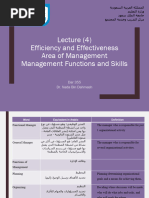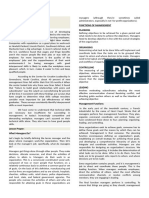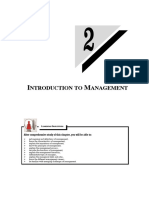0 ratings0% found this document useful (0 votes)
17 viewsMGMT Quiz
MGMT Quiz
Uploaded by
siayznnOrganization refers to a social entity that is goal directed and deliberately structured. Effectiveness refers to the degree to which an organization achieves its stated goals. Technical skills include specialized knowledge and analytical ability. Managers spend on average less than nine minutes on any one activity as they shift gears quickly. One important idea in the text's definition of management is the management functions of planning, organizing, leading, and controlling. Top managers are responsible for the entire organization.
Copyright:
© All Rights Reserved
Available Formats
Download as PDF, TXT or read online from Scribd
MGMT Quiz
MGMT Quiz
Uploaded by
siayznn0 ratings0% found this document useful (0 votes)
17 views1 pageOrganization refers to a social entity that is goal directed and deliberately structured. Effectiveness refers to the degree to which an organization achieves its stated goals. Technical skills include specialized knowledge and analytical ability. Managers spend on average less than nine minutes on any one activity as they shift gears quickly. One important idea in the text's definition of management is the management functions of planning, organizing, leading, and controlling. Top managers are responsible for the entire organization.
Copyright
© © All Rights Reserved
Available Formats
PDF, TXT or read online from Scribd
Share this document
Did you find this document useful?
Is this content inappropriate?
Organization refers to a social entity that is goal directed and deliberately structured. Effectiveness refers to the degree to which an organization achieves its stated goals. Technical skills include specialized knowledge and analytical ability. Managers spend on average less than nine minutes on any one activity as they shift gears quickly. One important idea in the text's definition of management is the management functions of planning, organizing, leading, and controlling. Top managers are responsible for the entire organization.
Copyright:
© All Rights Reserved
Available Formats
Download as PDF, TXT or read online from Scribd
Download as pdf or txt
0 ratings0% found this document useful (0 votes)
17 views1 pageMGMT Quiz
MGMT Quiz
Uploaded by
siayznnOrganization refers to a social entity that is goal directed and deliberately structured. Effectiveness refers to the degree to which an organization achieves its stated goals. Technical skills include specialized knowledge and analytical ability. Managers spend on average less than nine minutes on any one activity as they shift gears quickly. One important idea in the text's definition of management is the management functions of planning, organizing, leading, and controlling. Top managers are responsible for the entire organization.
Copyright:
© All Rights Reserved
Available Formats
Download as PDF, TXT or read online from Scribd
Download as pdf or txt
You are on page 1of 1
MGMT: Quiz1
Study online at https://quizlet.com/_1hcp42
A social entity that is goal directed and deliberately structured is
organization
referred to as a(n):
The degree to which an organization achieves a stated goal refers
effectiveness
to:
Which skill includes specialized knowledge and analytical ability? technical
Managers shift gears quickly and therefore, the average time
nine minutes
spent on any one activity is less than _____.
One of the important ideas in the text's definition of management the management functions of planning, organizing, leading, and
is: controlling
Which of the following are responsible for the entire organization? top managers
The negotiator role involves formal negotiations and bargaining to
What is the role of the negotiator?
attain outcomes for the manager's unit of responsibility.
By definition, an organization is considered _____ because it is
social entity
made up of two or more people.
_____ managers are responsible for departments that perform a
single functional task and have employees with similar training functional
and skills.
_____ are most important at the top management level. conceptual skills
The individual performer is a _____; whereas, the manager has
specialist; generalist
to be a(n) _____.
_____ is the management function concerned with monitoring
employees' activities, keeping the organization on track toward its controlling
goals, and making corrections as needed.
Which of these managers are in charge of departments such as
staff
finance and HR that support line departments?
Which of the following refers to the amount of resources used to
efficiency
achieve an organization's goal?
Which of the following is a characteristic of a traditional manage-
managers supervise team members' tasks
ment approach?
_____ are responsible for departments that perform a single task
functional managers
and have employees with similar training and skills.
Which of these is the use of influence to motivate employees to
leading
achieve organizational goals?
Monitoring activities and making corrections are part of: controlling
Which of the following is not a function of management? performance
The biggest mistake that many managers make is the failure to: communicate effectively
Selecting goals and ways to attain them refers to _____. planning
Which of these can best describe organizing? Assigning responsibility for task accomplishment
all of these. [poor communication skills, reactionary behavior, in-
Critical management missteps include:
ability to build a team, failure to adapt]
Without _____, no company can survive over the long run. innovation
Robert, a top-level manager at an advertising agency, spends a
significant part of his work day identifying goals for future organi-
planning
zational performance and deciding how to use resources to attain
these goals. This involves which management function?
1/1
You might also like
- Summary of Richard Daft's Book: ManagementDocument63 pagesSummary of Richard Daft's Book: ManagementBenjamin G. Dela Cruz88% (17)
- Class 12 Business Studies 2024-25 Notes Chapter 1 Nature and Significance of ManagementDocument25 pagesClass 12 Business Studies 2024-25 Notes Chapter 1 Nature and Significance of Managementsaxenajaya25No ratings yet
- Chapter 2 - Managing People and OrganizationDocument11 pagesChapter 2 - Managing People and OrganizationSteffany Roque100% (1)
- MPO Assignment 1 (02000539)Document13 pagesMPO Assignment 1 (02000539)Aarkash Kannangara0% (1)
- ORGANIC AGRICULTRE PRODUCTION NC II My OwnDocument51 pagesORGANIC AGRICULTRE PRODUCTION NC II My Ownjazzy mallariNo ratings yet
- Assignment On Management Process and Organization BehaviorDocument48 pagesAssignment On Management Process and Organization Behaviordiplococcous72% (18)
- SITXHRM003 - Lead and Manage People Activity WorkbookDocument35 pagesSITXHRM003 - Lead and Manage People Activity WorkbookDarlene Enderez100% (5)
- BDM 202 Chapter 1Document19 pagesBDM 202 Chapter 1siti sapikahwanaNo ratings yet
- Ethiopian Institutes of Architecture, Building Construction and City Development (Eiabc)Document37 pagesEthiopian Institutes of Architecture, Building Construction and City Development (Eiabc)malik macNo ratings yet
- Chapter 1 - Introduction To ManagementDocument31 pagesChapter 1 - Introduction To ManagementLe Thuy TrangNo ratings yet
- Bus 1038 Chapter 7 Study GuideDocument16 pagesBus 1038 Chapter 7 Study Guidemichellehuynh031005No ratings yet
- Chapter 1 - Introduction To ManagementDocument31 pagesChapter 1 - Introduction To ManagementHoàng Ngân HàNo ratings yet
- 1. Introduction to Management_StudentDocument10 pages1. Introduction to Management_Studentlol417662No ratings yet
- Fundamentals of General ManagmnetDocument20 pagesFundamentals of General ManagmnethayelomNo ratings yet
- Sample of Meaning of Management PrintDocument2 pagesSample of Meaning of Management PrintkajuNo ratings yet
- Org Man - Q1-Week1-Module Als Gas 11Document6 pagesOrg Man - Q1-Week1-Module Als Gas 11veihn21No ratings yet
- 101Document4 pages101vadla snehaNo ratings yet
- Chapter-1 Introduction To ManagementDocument22 pagesChapter-1 Introduction To Managementsyed emonNo ratings yet
- Om 3RD NotesDocument9 pagesOm 3RD NotesXai RomeroNo ratings yet
- No 21 - Nature of Function of ManagementDocument7 pagesNo 21 - Nature of Function of ManagementthilandprasadNo ratings yet
- CH 2 Introduction To ManagementDocument37 pagesCH 2 Introduction To Managementvenura sandeepaNo ratings yet
- CH 1 BSTDocument5 pagesCH 1 BSTownmovie46No ratings yet
- week 1. Welcome. Mgmt FunctionsDocument25 pagesweek 1. Welcome. Mgmt FunctionsgabrielNo ratings yet
- CBMEC101 Mod1 Final PDFDocument14 pagesCBMEC101 Mod1 Final PDFasasasNo ratings yet
- CBMEC101 Mod1 Final PDFDocument14 pagesCBMEC101 Mod1 Final PDFasasasNo ratings yet
- Chapter 1 - Introduction To Management - STDocument22 pagesChapter 1 - Introduction To Management - STnhanvt0702No ratings yet
- محاضره4Document41 pagesمحاضره42004abdullahalshammariNo ratings yet
- L01 Introduction to Business Psychology & Management ( Business Psychology & Management )Document6 pagesL01 Introduction to Business Psychology & Management ( Business Psychology & Management )Elijah TanNo ratings yet
- CHAPETR 1 Introduction To ManagementDocument7 pagesCHAPETR 1 Introduction To Managementአድሜ ልስልሱNo ratings yet
- Week 001 Nature Concept of ManagementDocument5 pagesWeek 001 Nature Concept of ManagementJoana MarieNo ratings yet
- Module OamDocument168 pagesModule OamElla Marie MonteNo ratings yet
- CHAPTER 1 - IMT2412 Industrial ManagementDocument25 pagesCHAPTER 1 - IMT2412 Industrial Managementirfan7 abgNo ratings yet
- Management Skills - Types and Examples of Management Skills PDFDocument7 pagesManagement Skills - Types and Examples of Management Skills PDFSabeeh100% (2)
- CH 1 Overview of MGMTDocument11 pagesCH 1 Overview of MGMTJOHN CONo ratings yet
- Lec 2Document57 pagesLec 2mernasenger753No ratings yet
- Chapter 1 Study Guide - Intro To Business ManagementDocument3 pagesChapter 1 Study Guide - Intro To Business ManagementGrace JungNo ratings yet
- Lesson 2. Management and ManagerDocument4 pagesLesson 2. Management and ManagerNHASSER PASANDALANNo ratings yet
- MGMT 1Document11 pagesMGMT 1getachewfikire0955955427No ratings yet
- Engineering Mangement: Lecture #1Document55 pagesEngineering Mangement: Lecture #1sadiq aminNo ratings yet
- MODS 1Document6 pagesMODS 1hdgsvdbnfNo ratings yet
- Hbor Prelims ReviewerDocument79 pagesHbor Prelims ReviewerCrystel Kate MananganNo ratings yet
- Management Process and Goal AttainmentDocument14 pagesManagement Process and Goal AttainmentAbdalrhman MahmoudNo ratings yet
- Module 1 Introduction: Planning: Means Thinking of Their Actions in Advance. OrganizingDocument39 pagesModule 1 Introduction: Planning: Means Thinking of Their Actions in Advance. OrganizingMeghana MeghaNo ratings yet
- MSK Module-1Document22 pagesMSK Module-1Shridhar GowdaNo ratings yet
- Introduction To MamagementDocument93 pagesIntroduction To Mamagementbereket1025No ratings yet
- MPP PDF 1Document5 pagesMPP PDF 1Jayant JoshiNo ratings yet
- fnal-Module-2-Performing-Duties-and-Functions-of-an-Enterprise-Owner.doc-version-1 (1)Document14 pagesfnal-Module-2-Performing-Duties-and-Functions-of-an-Enterprise-Owner.doc-version-1 (1)REX ESPERIDIONNo ratings yet
- MBA 208 Report PDFDocument41 pagesMBA 208 Report PDFDaniella LampteyNo ratings yet
- CHAPTER 1 An Overview of Organization and ManagementDocument29 pagesCHAPTER 1 An Overview of Organization and ManagementStephen Kyle PilapilNo ratings yet
- Roles and Skills of ManagersDocument9 pagesRoles and Skills of Managersarjun SinghNo ratings yet
- MGT CH OneDocument40 pagesMGT CH Onefraolkuma2914No ratings yet
- Nature and Concept of Management: Grade: 11 Track: ABM Semester: 1Document9 pagesNature and Concept of Management: Grade: 11 Track: ABM Semester: 1jelineNo ratings yet
- OM PPT Manager's Job Functions Roles and SkillsDocument17 pagesOM PPT Manager's Job Functions Roles and SkillsRosette UngabNo ratings yet
- Introduction To Management Lecture1Document20 pagesIntroduction To Management Lecture14048 Ansa Rizwan BSSEF19 RizwanNo ratings yet
- MF - Chap 1Document16 pagesMF - Chap 1idusarasenadeeraNo ratings yet
- Chapter OneeeeeeeeeDocument10 pagesChapter Oneeeeeeeeejoba45689No ratings yet
- Unit 1 IntroductionDocument20 pagesUnit 1 Introductionjashan.shresthaNo ratings yet
- Me Full-1Document95 pagesMe Full-1Aishwarya LakshmanNo ratings yet
- Module 1 Introduction: Planning: Means Thinking of Their Actions in Advance. OrganizingDocument34 pagesModule 1 Introduction: Planning: Means Thinking of Their Actions in Advance. OrganizingAbhishek WilsonNo ratings yet
- 17 Develop Teams and IndividualsDocument6 pages17 Develop Teams and IndividualsSamuel AdamuNo ratings yet
- Null 8Document15 pagesNull 8preciouskazvita7No ratings yet
- PM Terms MergedDocument709 pagesPM Terms MergedSenthil KumarNo ratings yet
- Crewing Model PDFDocument8 pagesCrewing Model PDFDedy KristiawanNo ratings yet
- Student Assessment Tasks BSBPMG522 Undertake Project Work: Student Name: Student NumberDocument28 pagesStudent Assessment Tasks BSBPMG522 Undertake Project Work: Student Name: Student NumberNimisha Rai0% (1)
- Best Practices in Distributed Workforce ManagementDocument14 pagesBest Practices in Distributed Workforce ManagementFatma MamloukNo ratings yet
- Working With International TeamsDocument20 pagesWorking With International TeamsEdrick SoegiantoNo ratings yet
- Bbgo4103 Organisatonal BehaviourDocument13 pagesBbgo4103 Organisatonal BehavioureugeneNo ratings yet
- Skip To Main Content: Shalu BajpaiDocument8 pagesSkip To Main Content: Shalu BajpaiShalu TiwariNo ratings yet
- APM Assignment 1Document20 pagesAPM Assignment 1Gillian MachetheNo ratings yet
- Conflict and Conflict ManagementDocument16 pagesConflict and Conflict Managementsittoolwin100% (3)
- Ogl 321 Final PaperDocument6 pagesOgl 321 Final Paperapi-639230448No ratings yet
- Barthel Hess Digital Transformation ProjectsDocument15 pagesBarthel Hess Digital Transformation ProjectsPaul Vintimilla CarrascoNo ratings yet
- Benchmarking The: Learning Capability of OrganizationsDocument9 pagesBenchmarking The: Learning Capability of Organizationsዝምታ ተሻለNo ratings yet
- Green HRM in Emergence APJM in PressDocument58 pagesGreen HRM in Emergence APJM in PressPre JoiningNo ratings yet
- CIDB L5 LP03 Leadership & Strategy PlanningDocument29 pagesCIDB L5 LP03 Leadership & Strategy PlanningMohd Zailani Mohamad JamalNo ratings yet
- 3249U Engineering Notebook 2022-2023Document510 pages3249U Engineering Notebook 2022-2023Ivan Miguel Londoño SilvaNo ratings yet
- Indian Leadership Styles PDFDocument17 pagesIndian Leadership Styles PDFRavi KumarNo ratings yet
- Transformational Leadership in EducationDocument6 pagesTransformational Leadership in EducationMagelyn NBNo ratings yet
- ABM G11 Chap 4 Org MGTDocument15 pagesABM G11 Chap 4 Org MGTEljey Eushe F. SorianoNo ratings yet
- MGT 515Document5 pagesMGT 515Saad dyalNo ratings yet
- Behavioural Interview QuestionsDocument13 pagesBehavioural Interview Questionskumar3333100% (1)
- Weekly Challenge 2: Ry Again Once You Are Ready Grade Received To PassDocument5 pagesWeekly Challenge 2: Ry Again Once You Are Ready Grade Received To Passpower1980No ratings yet
- Software Project Management (COSC 352)Document20 pagesSoftware Project Management (COSC 352)frezer mesfinNo ratings yet
- Session # 9 Process ConsultingDocument15 pagesSession # 9 Process ConsultingSHWETA SINGHAL PGPHRM 2021-23 BatchNo ratings yet
- Apple Product ManagerDocument2 pagesApple Product ManagerWasNo ratings yet
- MEMO GR 10 LO Final Year End Exam 2023Document27 pagesMEMO GR 10 LO Final Year End Exam 2023mathapelomakoma07No ratings yet
- Udemy Guide Manager Training EbookDocument29 pagesUdemy Guide Manager Training EbookGuido BrunoNo ratings yet
- Human Relation in An OrganizationDocument51 pagesHuman Relation in An Organizationdiana tolopiaNo ratings yet

























































































